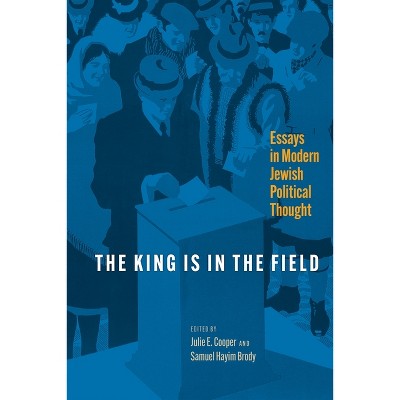Sponsored

An Economy of Strangers - (Jewish Culture and Contexts) by Avinoam Yuval-Naeh (Hardcover)
In Stock
Sponsored
About this item
Highlights
- One of the most persistent, powerful, and dangerous notions in the history of the Jews in the diaspora is the prodigious talent attributed to them in all things economic.
- About the Author: Avinoam Yuval-Naeh is a post-doctoral fellow at the University of Haifa.
- 264 Pages
- History, Jewish
- Series Name: Jewish Culture and Contexts
Description
About the Book
"In this book, historian Avinoam Yuval-Naeh investigates how and why eighteenth-century English society projected anxieties regarding the parallel development of the modern economy and of the re-establishment of the Jewish population upon the other, thus offering new insights into the interface of religious ideas and economic life"--Book Synopsis
One of the most persistent, powerful, and dangerous notions in the history of the Jews in the diaspora is the prodigious talent attributed to them in all things economic. From the medieval Jewish usurer through the early-modern port-Jew and court-Jew to the grand financier of the nineteenth and twentieth centuries and contemporary investors, Jews loom large in the economic imagination. For capitalists and Marxists, libertarians and radical reformers, Jews are intertwined with the economy. This association has become so natural that we often overlook the history behind the making and remaking of the complex cluster of perceptions about Jews and economy, which emerged within different historical contexts to meet a variety of personal and societal anxieties and needs.
In An Economy of Strangers, Avinoam Yuval-Naeh historicizes this association by focusing on one specific time and place--the financial revolution that England underwent from the late seventeenth century that coincided with the reestablishment of the Jewish population there for the first time in almost four hundred years. European Christian societies had to that point shunned finance and constructed a normative system to avoid it, relying on the figure of the Jew as a foil. But as the economy modernized in the seventeenth century, finance became the hinge of national power. Finance's rise in England provoked intense national debates. Could financial economy, based on lending money on interest, be accommodated within Christian state and society when it had previously been understood as a Jewish practice? By projecting the modern economy and the Jewish community onto each other, the Christian majority imbued them with interrelated meanings. This braiding together of parallel developments, Yuval-Naeh argues, reveals in a meaningful way how the contemporary and wide-ranging association of Jews with the modern economy could be created.Review Quotes
"Avinoam Yuval-Naeh's thoroughly researched and compellingly written book brings together Jewish history and the financial revolution to show how contemporaries associated 'Jewish' characteristics with the changing values and practices of modern finance and capitalism."-- "Dana Rabin, author of Britain and Its Internal Others, 1750-1800: Under Rule of Law"
"With erudition, clarity, and insight, An Economy of Strangers reveals how contemporaries used Jews, Judaism, and Jewish history to comprehend and evaluate the emergence of new commercial realities."-- "David Feldman, Birkbeck, University of London"
About the Author
Avinoam Yuval-Naeh is a post-doctoral fellow at the University of Haifa. He is the author of articles in The Journal of Early Modern History and Historia. This is his first book.










